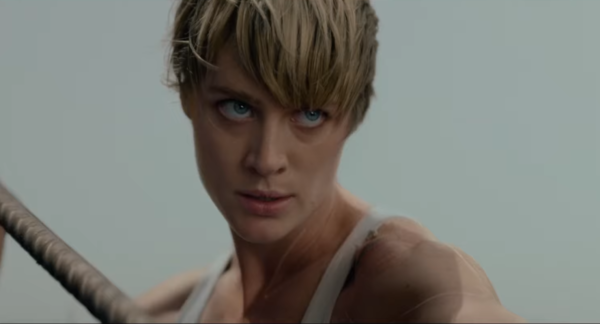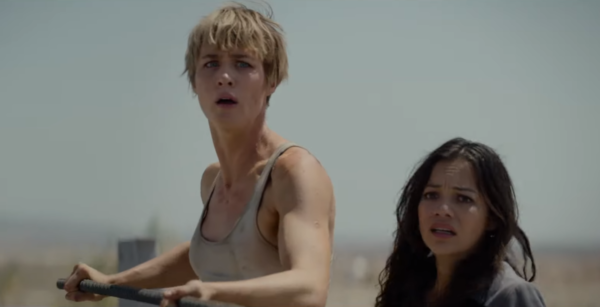Harrison Abbott chats with Terminator: Dark Fate star Mackenzie Davis…
Rounding off the junket interviews for Terminator: Dark Fate is our chat with Mackenzie Davis, who plays the time-traveling Grace. Much like Kyle Reese in the franchise progenitor, Grace is sent back from a desolate future in order to rescue a potential savior of mankind from the clutches of a cyborg assassin.
Going up against an upgraded Terminator model (Gabriel Luna’s Rev 9), this escort mission naturally entails a lot of running, punching, shooting, stabbing and general endangerment. All of which is new territory to Davis, whose on screen-persona is typically more mild-mannered, as anyone who has seen her work in Black Mirror or Blade Runner: 2049 will attest. To find out what it was like making such a radical gear change, we sat down with the Canadian actress and asked how she prepared for the physical demands of the role and what it was like watching herself on-screen as an action heroine.
A human-robot hybrid, Grace is a completely fresh addition to the Terminator canon. Were you excited to define this new type of character and put your own stamp on the franchise?
I guess I thought of it less in terms of what it meant for the franchise and more in terms of what it meant for me. It felt like a very new thing to inhabit and I had to think about how I could do it in a way that was even remotely… well, good [Laughs]. That was of great concern to me because this role was so far outside my wheelhouse. So to answer your question, sure there was another tier of pressure within the franchise, but I was so consumed with my own insecurity that I didn’t really get to that level.
Given that she’s neither completely organic or completely machine, how does that affect your performance? Does it impact your physicality?
Not really, because I assumed the technology was so advanced that [Grace] wouldn’t be constantly aware of it. However, what did affect my physicality, far more than the mechanical stuff, was the character’s military background. I thought that she would need to move and stand in a specific way, which came organically out of my own training. You know, they taught me that if you’re holding a certain type of gun then you need to have a [corresponding] stance and stuff like that.
Not only that, but I was working out every day for 9 months, which ended up changing my body because I got a really muscular back and these big shoulders. So I suddenly required more space to occupy and the way that I moved was [therefore] altered.
That makes sense because you’re involved with like 90% of the action here. It’s not like you’re limited to just one fighting style either. You get to wield hammers, fight hand-to-hand, use a metal chain – how was it keeping on top of all that? Were any of them more difficult than others?
I struggled with aiming the rebar on the back of the truck because I’m just bad at throwing. I can’t tell you how much of a non-athlete I was before shooting this [Laughs]. My body coordination is outrageous, especially when multiple elements need to be moving in some kind of graceful or synchronised way. So trying to find the right body language, trying to throw proper punches, trying to swing hammers efficiently, trying to run without my arms flailing everywhere: all that was a challenge. You know, I had to tone down a very expressive, gesticulating part of myself [Laughs].
I guess a lot of it required the aid of CGI as well. How did you find that mix? Were you always given something tangible to latch onto?
There was so much practical actually, I mean the CGI is mostly things like the night sky. But I was there, hanging off a hummer for a week and a half, climbing ropes and all that stuff. You know, everything was practical onset and then CGI elements were filled in afterwards. Obviously there are still amazing stunt performers doing stuff that I can’t do, but there’s very little CG replacement. And I think that was true for all of [the cast].
Speaking of that cast, what was it like sharing the screen with an icon like Linda Hamilton?
Yeah, it was amazing. It was incredible to be part of her return and it’s really exciting to see that people are actually hungry for more Linda Hamilton back in their lives, because she’s such an amazing human being and acted as a wonderful guide to us. Her presence, her knowledge and her commitment to this character just shifted the dynamic on set and made it feel extra important. Like we were all trying to make her proud. Plus she’s also Sarah Conner which is amazing and cool [Laughs]
What about Tim Miller as a director? How did you find working with him?
I think one of my major fears going into this was that we’d have an action director that was like a mile away from the actors all the time, just on a speaker yelling: ‘’Cry Less!’’ or whatever. Like there would be no room for small, intimate storytelling.
But Tim is actually so character driven. He’s the first person to admit that it’s great to have an explosion, but if nobody that you care about is in danger, then the audience isn’t going to be invested. So you have to create these real characters and avoid bullshit tropes. You have to root it in some basis of reality and Tim really understood that.
Ah, he’s just the best guy, he’s such a lovely human being and such a great shepherd for this movie – both with his visual expertise and his emotional presence. He was able to make a really sensitive Terminator film, if such a thing exists.
That reminds me of the crossing the Mexican border subplot in the film, because that’s quite a lengthy, character-driven section. Everything settles down for a bit and it kind of focuses on the plight of these detainees, which was not something I was expecting to see here. What was your reaction to reading it in the script?
I thought it was cool. Although showing up on the day was a lot more emotional than we were expecting. You know, what’s happening in America right now – and in many other parts of the world but particularly at our southern border – is a horror. It feels like science fiction, it’s this era that we swore would never be repeated and now we have people locked up and children dying in cages. And you hear about it, but it’s still cloaked in secrecy.
I think our movie is pretty generous in its depiction – there’s not the squalor and the conditions that there are in real life – but it was still tough to see.
Absolutely, I agree 100%.
I don’t know, I think it’s important to have an enormous depiction of something that’s really happening.
During the plane set-piece, which can be seen in the trailers, everyone onboard kind of goes into a state of Zero G. How was filming that achieved?
They built this unbelievable gimbal, an enormous feat of engineering that was hollow on either side. And it would rotate 180° while we were inside of it. The thing is, we shot that sequence for so long, in little pieces here and there, to the point where you kind of lost track of where you were. It was done out of order, upside down, people were changing positions, it was all quite chaotic to film. But I think it looks more [coherent] when you’re actually watching it. I think it turned out really well.
So this is the first Terminator since 1992 to get an R-Rating and I was wondering if you had any thoughts on how that benefits the film?
It’s a violent depiction of a horrible future world and I think that neutering that, just to make it palatable to a wider range of viewers, would not be true to the content. It’s not for everybody, it’s supposed to be intense. The language and the violence match up with the world, and if you remove either part than it feels disingenuous. I mean, you can’t have this kind of story and then have no blood, it would be like you were removing the consequences.
Obviously this film is crammed with spectacular action, but I was wondering if there’s a specific set-piece that you are most excited for viewers to see?
The first two fights of the movie, the one in the factory and the one on the freeway, were so much fun for me to shoot. I think a lot of that’s already been shown by now though, so maybe I’m more excited for audiences to watch the ones they haven’t already been exposed to. I don’t know, these movies always show everything in the trailers nowadays, so I don’t know what people haven’t seen yet [Laughs].
But there’s loads of them. My boyfriend and I, along with some of the cast, went to see the movie on IMAX this week and everybody came out thinking: ‘’I have no idea how long that was. It just started, I was gripped and then it was over’’.
What was it like seeing yourself on that massive IMAX screen, as an action heroine? Was it a surreal experience?
Yeah, I would say that [Laughs] It’s just strange to see a version of yourself doing anything. I think it’s good to do it though.
To watch yourself?
Yeah, you get to learn from it. It’s not exactly comfortable, but you also want to see the finished product because everybody worked so hard on it. I mean, Tim has poured years of his life into this. That being said, it’s still hard for me to enjoy whenever I’m on screen, I’m like: ‘’No stop!’’
My final question is, what’s the aspect of this movie that you are proudest of?
It’s a fun, big movie that also moves you pretty deeply. I think it’s pretty hard to find that combination, especially now. These kind of movies used to give you classic, really great stories that you could connect with, alongside all the pyrotechnics and sci-fi elements. But now it seems like a lot of these tentpole films only really satisfy that technical appetite and you forget about the human side. I hope that we manage to do both, because it would be a little boring if we didn’t.
Many thanks to Mackenzie Davis for taking the time for this interview.
Terminator: Dark Fate is in cinemas from Wednesday, 23rd October.
Harrison Abbott















